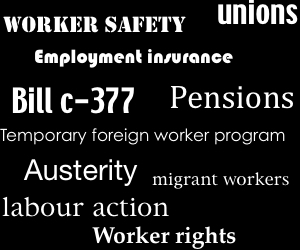Workers rally for pay equity and affordable childcare
More than 100 women leaders of Canada’s largest healthcare union gathered in downtown Toronto this morning for a flash mob to raise awareness of the gender wage gap in Ontario, where they say women on average earn less than two-thirds the income earned by men. The event kicks off a weekend of International Women’s Day activities.
In Vancouver, labour groups and community activists will celebrate International Women’s Day tomorrow, Saturday, March 9, with “a noise parade for childcare.” The B.C. General Employees Union wants to see $10-a-day childcare for the province.
Two blows dealt to temp foreign worker program in B.C.
It’s not been a good week for the federal government’s oft-criticized temporary foreign worker program.
Complaints of rampant abuse were given more credibility with news that Northland Properties Corporation, which operates Denny’s and Dencan Restaurants, shelled out $1.3-million to settle a class-action lawsuit launched by former employees brought in through the program. The workers say they were forced to pay thousands of dollars in illegal recruitment fees and travel to Canada for jobs that either never materialized, or where they ended up working unpaid hours.
Then on Wednesday, the Federal Court granted two B.C. unions the right to pursue a judicial review of the government’s decision to grant permits to HD Mining to import more than 200 temporary foreign workers.
The B.C. Federation of Labour recently began running radio ads critical of the temporary foreign worker program in Conservative MPs’ ridings across the province.
Quebec groups form coalition against EI changes; feds considering reversal on funding of job training for unemployed
On Monday, seven major labour unions and advocacy groups in Quebec launched a coalition opposing the Harper government’s changes to employment insurance.
Further details emerged this week of the tactics being used by “integrity investigators” as they drop in on EI claimants for surprise house calls.
Meanwhile, the federal government has signalled it’s considering cancelling the annual $2-billion transfer it makes to the provinces to fund job training programs for EI recipients, in favour of some sort of federally-administered voucher system for job training. That’s a 180-degree reversal from the direction it set in 2007 when it transferred responsibility to the provinces.
Alberta releases austerity budget; education minister threatens teacher strike on their behalf
Alberta’s 2013-14 budget, released on Thursday, has teachers, health-care workers and other public-sector employees bracing for wage freezes and cuts. The deepest cuts are to education.
“In a province that’s growing by 100,000 people a year, a 0% increase amounts to a substantial cut,” said the head of the Alberta Federation of Labour. No other province spends less on public services as a share of its economy than Alberta, according to the federation.
Meanwhile, Alberta’s education minister warned he fears “labour disruptions are on the horizon in the next two years” and is hinting at the possibility of imposing a legislated contract on education workers to avert a strike. The Alberta Teachers’ Association, which is in negotiation over contracts with school boards and hasn’t actually made any move toward strike action, accused the minister of manufacturing a crisis.
Pacific trade deal talks resume; CETA negotiations march closer to end point
Canadian negotiators were in Singapore this week for another round of talks on the Trans-Pacific Partnership (TPP). It’s not clear yet exactly what the trade deal will mean for labour in Canada, but if its similarity to NAFTA provides any clues, say critics, the prospects are not good. What’s more, the Canadian government has joined other countries in opposing measures favoured by the U.S. for stronger enforcement of labour rights under the deal.
Meanwhile, negotiations over the Canada-EU trade agreement (CETA) continue, and are reported to be nearing an end point. The effects of that deal on provincial and municipal governments’ ability to keep basic services like drinking water public, and to favour local procurement and regional development, has alarmed labour groups and legal analysts alike.
Other headlines of note
International Women’s Day: What’s the way forward?
50,000 Brazilians march for labour rights
Despite World Cup pledges, building site accidents soar in Qatar
Pipefitters and plumbers union urges Obama to approve Keystone XL
Nfld. & Labrador: Gov’t cuts funding for employment assistance programs
BC Liberal pension plan misses key to retirement security
Ontario boards set to fight elementary teachers’ union over extracurricular boycott
Postie union should apologize for ‘anti-Israel rhetoric,’ says minister
Angry labour leaders confronting WorkSafe NB CEO



